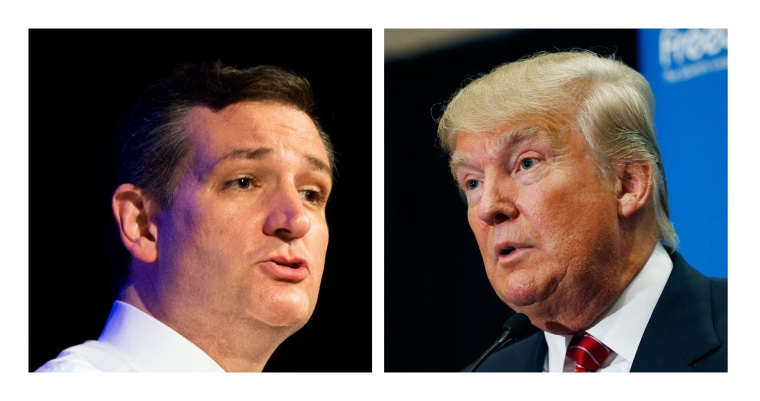With just over a week until the Feb. 1 Iowa caucus, Republicans in the state are watching two key storylines: The intense battle for first place between Donald Trump and Ted Cruz and the contest for third place, where Sen. Marco Rubio has an edge.
Winning the state is especially critical to Cruz, who is hoping a strong performance will carry him to a victory in South Carolina and later a decisive sweep of wins in the March 1 “SEC primary,” which includes many Southern states. Trump, who has looked significantly stronger in New Hampshire polls, may be less reliant on Iowa for momentum.
That doesn’t mean the state is irrelevant to the other contenders. Many of the more establishment-friendly candidates are playing in the state in the hopes a decent finish might help distinguish them in New Hampshire. Rubio got a boost on Saturday by winning an endorsement from the Des Moines Register, Iowa’s largest paper, and he will be campaigning in the state continuously this week. New Jersey Gov. Chris Christie and former Florida Gov. Jeb Bush are also competing in the state, however, and pro-Bush Right to Rise PAC has spent $20 million on attack ads against Rubio alone.
“If Rubio outperforms expectations and Cruz doesn’t do as well, it may not even matter who finishes first,” Iowa Republican strategist Jeff Patch told MSNBC. “It’s the momentum and energy coming out of Iowa that counts.”
After months of relative peace, Cruz and Trump have spent the final stretch lobbing attacks at each other in events and over the airwaves. Trump has gone after Cruz’s ties to Wall Street, including his wife’s work at Goldman Sachs; run ads accusing the Texas senator of flip-flopping on legal status for undocumented immigrants; and even questioned whether the Canadian-born senator is eligible to be president (Cruz and many prominent legal experts believe he is). Cruz is running ads in the state highlighting Trump’s use of eminent domain to try to force a widow from her home to build a parking lot for a casino.
Trump and Cruz, whom polls have shown to be locked in a tight contest for weeks, have run very different campaigns.
Following in the footsteps of previous winners like Mike Huckabee and Rick Santorum, Cruz has blitzed the state’s 99 counties with small events and carefully courted activists and lawmakers with influence among the state’s powerful social conservative voting bloc. This month, he named two of his most prized Iowa endorsers – hardline anti-immigration Congressman Steve King and evangelical leader Bob Vander Plaats – as national co-chairs of his campaign.
Trump has focused on less personal events with crowds of thousands and keeping up a high profile in national media, while still building a team that includes some prominent Iowa Republicans.
“If Trump wins Iowa, which I think is very possible, it is going to change how every future candidate thinks about Iowa,” David Andersen, a professor of political science at Iowa State University, told MSNBC.
He could get some help from Sarah Palin, who endorsed him last week and previously gave freshman Iowa Sen. Joni Ernst a boost in her competitive primary in 2014.
Craig Robinson, editor of the Iowa Republican, told MSNBC the back and forth in celebrity endorsements between Cruz and Trump has been one of the most fascinating stories to watch.
“[Cruz gets] Phil Robertson? I get Willie Robertson,” he said, referring to the two “Duck Dynasty” stars who split their support last week. “You think I have ‘New York values’? I’ll get Sarah Palin.”
One key political issue in the state where Cruz and Trump have diverged is ethanol. In a daring move for an Iowa-focused candidate, Cruz came out early for ending the renewable fuel standard (RFS), which helps subsidize corn that goes into ethanol.
In recent days, Iowa Gov. Terry Branstad has openly campaigned against Cruz over his ethanol position, arguing that it “could be very damaging to our state” if he wins the caucus. Other top establishment figures in the state, including Sen. Chuck Grassley and state GOP chairman Jeff Kaufmann, have introduced Trump at rallies this week without endorsing him, which could help give him a veneer of credibility with more traditional voters.
Cruz massaged his position slightly this month by clarifying he would phase the RFS out over five years rather than immediately. Sensing an opening, Trump has openly embraced the RFS and even called for requiring more ethanol.
Cruz has focused on courting voters in the state’s evangelical-heavy rural counties, which broke for Santorum in 2012, while Rubio and his allies have poured their cash into advertising in urban areas like Des Moines and Cedar Rapids that broke for Mitt Romney. Trump has pursued a less finely tuned approach that hinges on whether he can bring in disaffected independents and even Democrats to the polls who normally might not vote.
For Trump, his emphasis on nontraditional voters makes Monday’s vote an important test of his viability. Skeptics point to a minimal increase in voters registering as Republicans so far as evidence the independents backing Trump aren’t committed enough to actually caucus for him.
“I’d imagine if there were an earth-shattering movement for Trump, they’d have people consistently adding their names to the rolls,” Patch, the GOP strategist, said.
Voters can still switch registration at the caucus site, however, and Trump’s team is confident that the thousands of fans willing to wait in long lines in the cold for his rallies will do the same come caucus time. There are few clichés in politics older than “It all comes down to turnout,” but Trump’s unorthodox campaign has to prove it can turn its polling dominance into actual votes to push him into the nomination.
This article originally appeared on MSNBC.com.

